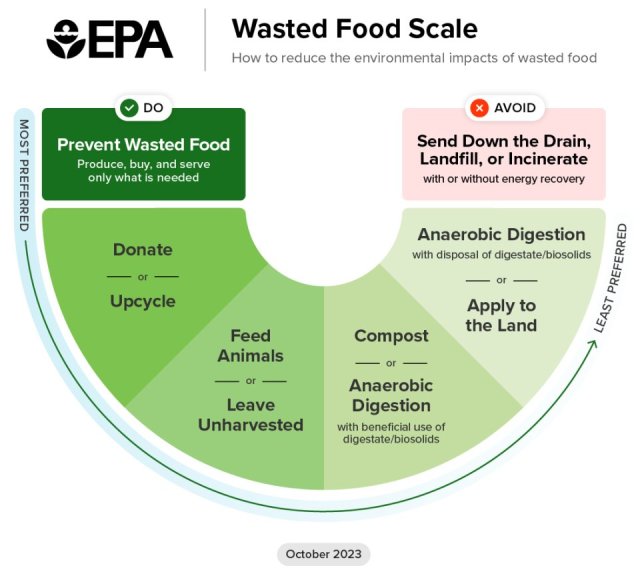Identifying Sustainable Food Service and Food Service Ware
Introduction
When looking to make your food service sustainable, there are many options to consider. This webpage provides some resources on sustainable food service practices (e.g. food and beverage offerings, waste management options, energy and water efficient operations, etc.) as well as some of the products that may be provided under these services (e.g. plates, bowls, cups, cutlery, take-out containers, etc.).
Sustainability Considerations
Food Service
- Reduction of single-use plastic in beverage offerings.
- Preferred options include beverage refill stations with reusable cups or single-use aluminum beverage containers.
- Energy & water efficient equipment operations.
- Waste diversion programs (i.e. waste reduction, materials recycling, composting and food donation).
- Bulk servicing (i.e. bulk condiments rather than individual packets).
- Green cleaning practices.
- Integrated pest management/green pest control alternatives.
- Look for products certified to one of EPA’s recommended standards and ecolabels in categories including food service ware, cleaning products, trash bags, and paper towels.
Food Service Ware (plates, bowls, cups, cutlery, take-out containers, etc.)
First Choice: Reusable Food Service Ware
Reusable food service ware is the preferred choice because it will use less energy and fewer resources over its lifespan if an effective reuse system is developed and operated. Procurement of reusable food service ware can also save money over time compared to single-use options.
- Purchase reusable food service ware certified to an environmental performance standard. EPA recommends GreenScreen Certified® Standard for Reusable Food Packaging, Food Service Ware, & Cookware and Cradle to Cradle Certified® Product Standard for federal purchasing.
- Reusable food service ware should be used in a system that enables repeated collection, washing, and return.
- If there is limited availability of certified reusables, purchase products made from ceramic, porcelain, glass, metal, or other durable, less toxic materials.
If reusables cannot be procured for all needed food service ware:
Second Choice: Certified Commercially Compostable Food Service Ware
Certified commercially compostable food service ware is less preferred than reusables but preferred over certified recyclable options because they reduce conventional plastic waste and can support food scraps diversion from landfills if collected separately from other waste streams and sent to an appropriate facility. However, these products are designed to only be composted in commercial composting facilities and availability of such facilities across the country is limited. Additionally, some commercial composting facilities do not accept compostable products.
- Purchase certified commercially compostable food service ware certified to an environmental performance standard. EPA recommends GreenScreen Certified® Standard for Single-Use Food Service Ware & Thermal Paper, Cradle to Cradle Certified® Product Standard (Platinum Level in Product Circularity), and BPI Commercial Compostability Certification Scheme for federal purchasing.
- Purchase certified commercially compostable food service ware only if a commercial composting program is locally available, accepts the product types being purchased, and collection or hauling services are procured. Three stream waste sorting (composting, recycling, and landfill) should be provided where products are used, and collection bins should be clearly labeled with exact product types to ensure only the acceptable items are placed in each bin, thus preventing contamination of the various waste streams.
- When certified commercially compostable food service ware are provided at a specific location, no other types of single-use food service ware (i.e. recyclable or non-recyclable bowls, lids, utensils, condiment cups, etc.) should be provided in order to prevent contamination of the various waste streams. All food service ware should be reusable or certified commercially compostable.
Third Choice: Certified Recyclable Food Service Ware
Certified recyclable food service ware is the last preferred choice due to low recycling rates of the products caused by food contamination or small size (i.e., utensils).
- Purchase recyclable food service ware certified to an environmental performance standard. EPA recommends GreenScreen Certified® Standard for Single-Use Food Service Ware & Thermal Paper and Cradle to Cradle Certified® Product Standard (Platinum Level in Product Circularity) for federal purchasing.
- Purchase certified recyclable food service ware if reusables cannot be procured and if a commercial composting program is not locally available or does not accept compostable food service ware products, and if the local recycling program accepts the items for recycling. A minimum of two stream waste sorting (recycling and landfill) should be provided where products are used, and collection bins must be clearly labeled with exact product types to avoid compromising the quality of the waste stream/feedstock.
- Prioritize purchasing products made with recycled content materials that are accepted in the local recycling program.
- Products should be added to the collection bins clean (i.e. without food or beverage remains). Suppliers can provide washing and/or instructions for consumers to achieve this.
Additional Resources

- Food
- Food Service
- Food Service Guidelines for Federal Facilities
- GSA’s Green Procurement Compilation (GPC) is a comprehensive green purchasing resource designed for federal contracting personnel and program managers.
- Cafeteria products page, which identifies federal requirements for various cafeteria products.
- Cafeteria & food services page, which provides further guidance on greening service contracts
- Practice Green Health – Sustainable Food Service Operations
- Food Service Ware
- Food Waste
- Food Waste Reduction Alliance: Messy But Worth It. A whitepaper that offers tips from food service manufacturers, grocers and restaurants on how organizations can reduce food waste from within.
- National Restaurant Association’s Resources for Reducing & Managing Food Waste
- EPA Food Waste Prevention Options for Restaurants
